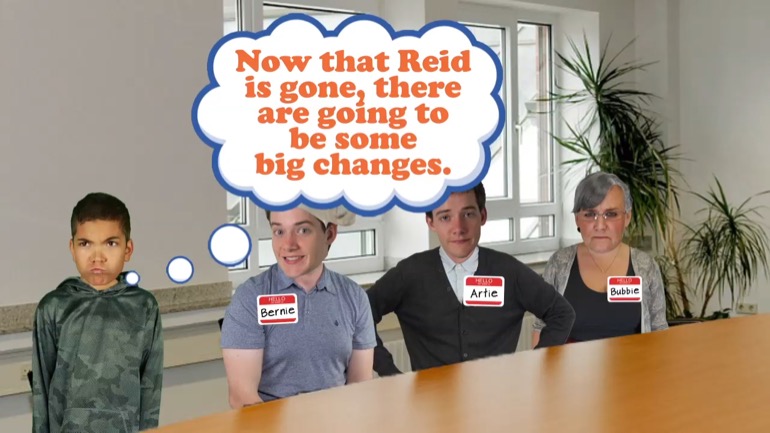ShmoopTube
Where Monty Python meets your 10th grade teacher.
Search Thousands of Shmoop Videos
Financial Responsibility Videos 957 videos
How are risk and reward related? Take more risk, expect more reward. A lottery ticket might be worth a billion dollars, but if the odds are one in...
What is par value? The notional value of a stock or bond before an offering takes place. When a company is started, founders come up with a par val...
Finance: What is Venture Capital? 755 Views
Share It!
Description:
What is venture capital? Venture capital is the money that companies use to start conducting business. Usually startups will go out and raise venture capital through wealthy investors or bank loans.
- Social Studies / Finance
- Finance / Financial Responsibility
- Life Skills / Personal Finance
- Finance / Finance Definitions
- Life Skills / Finance Definitions
- Finance / Personal Finance
- Courses / Finance Concepts
- Subjects / Finance and Economics
- Finance and Economics / Terms and Concepts
- Terms and Concepts / Banking
- Terms and Concepts / Bonds
- Terms and Concepts / Company Management
- Terms and Concepts / Company Valuation
- Terms and Concepts / Derivatives
- Terms and Concepts / Entrepreneur
- Terms and Concepts / Financial Theory
- Terms and Concepts / Incorporation
- Terms and Concepts / International
- Terms and Concepts / Investing
- Terms and Concepts / IPO
- Terms and Concepts / Managed Funds
- Terms and Concepts / Metrics
- Terms and Concepts / Stocks
- Terms and Concepts / Tax
- Terms and Concepts / Tech
- Terms and Concepts / Trading
- College and Career / Personal Finance
Transcript
- 00:00
finance a la shmoop- what is venture capital? Google Facebook Yahoo Netflix
- 00:08
LinkedIn snapchat Instagram well they were all originally funded by venture [logos flash across screen]
- 00:14
capital. and the common theme was that two college dropouts built these
- 00:18
companies starting in a garage in Silicon Valley, creating something
- 00:21
dot-com that would change the world. and the world's a mess so it needs a lot of
Full Transcript
- 00:26
changing. venture capital comes in a few flavors-
- 00:28
the earliest rounds are called seed capital, and it usually mean that an
- 00:33
original investor put in a few hundred grand, maybe a million or two .the money
- 00:37
was invested at the very beginning of a company when it usually has no revenues [seed capital defined]
- 00:41
no product no nothing. just a hope and a dream and a big idea .and the idea can be
- 00:46
huge. at one point Yahoo's original seed
- 00:49
investment returns 10,000 times its original capital. a regular seed level
- 00:54
investors are called angels and they are typically previously
- 00:58
successful founders or entrepreneurs who want to recycle precious high risk
- 01:02
capital back into the Silicon Valley ecosystem in that form. and yeah Angels [man holding money looks excited]
- 01:07
know that 99 plus percent of their investments go fully bankrupt, but a few
- 01:11
become lottery ticket winners which produce massive returns and those
- 01:15
returns make up for the many many many losses. well once a company has say a
- 01:19
million bucks in revenue and has likely burned through the original seed money
- 01:24
million-ish or so that they raised, well they would then seek to take in what's [money burns in a fire]
- 01:28
called an a round. ie a first level full venture capital round where the company
- 01:33
raises four or five million dollars to then bring it to the next level of
- 01:37
growth. either in product use or revenues or depth and power of its patents or
- 01:42
intellectual properties and so on. anyway later stages of venture capital
- 01:46
investment are cleverly tagged B C and D rounds. and when a company is in the tens
- 01:52
of millions of revenues looking at a hundred million around the corner well
- 01:56
they would raise what is called growth capital- if they're no longer a [people peek around a corner]
- 02:00
speculative venture and they then appeal to a lower risk lower reward group of
- 02:04
investors. so where does the venture capital money come from? well the initial
- 02:09
seed amounts are relatively tiny. a pocket of 50 million dollars might fun
- 02:13
a hundred early startup companies for years and in the scheme of all the
- 02:17
wealth and Silicon Valley well 50 million bucks is just lunch money. a
- 02:21
normal sized venture capital fund might have half a dozen partners and another [business people smile at each other]
- 02:25
half a dozen junior partners .it would raise money from what is called limited
- 02:29
partners and that has nothing to do with the department store. the people
- 02:33
responsible for investing the money diligently are called the general
- 02:37
partners, and for this pleasure the general partners charge roughly 2% a
- 02:42
year in management fees and then they also take a 20 to 30 percent success fee
- 02:47
or carry if their fund pays back all of its initial capital and then has real
- 02:52
profits. so for a normal-size venture capital fund now let's say there's just
- 02:56
four general partners if they raise four hundred million dollars, invest it well
- 03:00
and in say eight years they've produced maybe a dozen IPOs and they've sold [graph showing growth]
- 03:05
maybe a half a dozen other companies so that the 400 million originally raised
- 03:09
has now turned into 2.4 billion dollars well they would show a profit of 2
- 03:15
billion bucks, and if their carry was 25 percent then the partners would split
- 03:20
five hundred million dollars among the four of them. and they'd get that all in
- 03:24
addition to the nice fat salaries they were taking along the way, so yeah it's a
- 03:28
nice work if you can get it and then there's the other side of the street as
- 03:31
an entrepreneur, if you're looking to start any sort of major venture you'll
- 03:35
need to attract some venture capital unless you know you and your buddy in
- 03:39
the garage have a couple mil just lying around with nothing better to do. [two people sit behind computer screens]
Related Videos
GED Social Studies 1.1 Civics and Government
What is bankruptcy? Deadbeats who can't pay their bills declare bankruptcy. Either they borrowed too much money, or the business fell apart. They t...
What's a dividend? At will, the board of directors can pay a dividend on common stock. Usually, that payout is some percentage less than 100 of ear...
How are risk and reward related? Take more risk, expect more reward. A lottery ticket might be worth a billion dollars, but if the odds are one in...





































































































